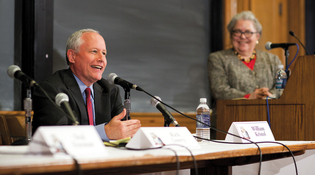 loading
loading
NotebookGod, man, and Yale, 60 years laterA program devoted to the legacy of William F. Buckley.  Christopher CapozzielloWeekly Standard editor William Kristol and former National Review managing editor Linda Bridges spoke at a panel discussion on the legacy of William F. Buckley Jr. ’50. View full imageOn one of the last bright fall days of the year, 150 friends, family, and admirers of the late William F. Buckley Jr. ’50 gathered on campus to celebrate the founding of modern conservatism—and to take a few jabs at Yale as a bastion of liberal orthodoxy. The November 4 event was organized by the William F. Buckley Jr. Program, a new student group with the stated aim of promoting intellectual diversity at Yale. The occasion marked the 60th anniversary of Buckley’s book God and Man at Yale, in which the young graduate called on his fellow alumni to root out the atheism, collectivism, and liberal dogma he found endemic here. The administration at the time failed to concede the point, and current president Richard Levin ’74PhD acknowledged in his opening remarks that the relationship between Yale and Buckley had not been close until the two parties began to make peace 15 years ago. Over three hour-long sessions in Linsly-Chittenden Hall, Buckley’s former classmates and colleagues remembered his moral and physical courage, humility, good cheer, love of life, vision, political savvy, patience, and seamanship. They also asserted the continuing relevance of Buckley’s critique of Yale, some arguing that the university today is just as intolerant as in 1950, others that it is far worse. R. Emmett Tyrrell Jr., founder of the American Spectator, said that in the war between Buckley and academia, “the atheists have triumphed. But he triumphed in public, in sophisticated aspects of world life, in adult America.” Later, as 200 guests sat down for dinner at the Omni Hotel, archival footage of Buckley interviewing Ronald Reagan played on a large video screen. Student leaders of today’s campus conservatism emceed a packed but brisk program of speeches by Buckley’s colleagues, siblings, and son. Former secretary of state Henry Kissinger recounted his famous public clashes with Buckley over the messy practical application of conservative ideals. But he also talked about what they had in common: “I always believed that Bill’s notion of conservatism and my notion of conservatism were very close to each other. That is, it reacts against a dominant agenda that treats society as a mechanism that can be subjected to continuous and endless tinkering.” William Kristol, editor of the Weekly Standard, paid tribute to both Buckley and the student organizers in his keynote address. “Some people, in a very laborious and self-conscious and somewhat off-putting way, spend a lot of time talking to youth about how youth are important,” he said. “I don’t think Bill did much of that. I think he, just in his own behavior, provided a path forward for young people in the conservative movement. Seeing what you all have done here for Yale and what you have done this afternoon and tonight leaves me with renewed enthusiasm and optimism and good cheer.”
The comment period has expired.
|
|